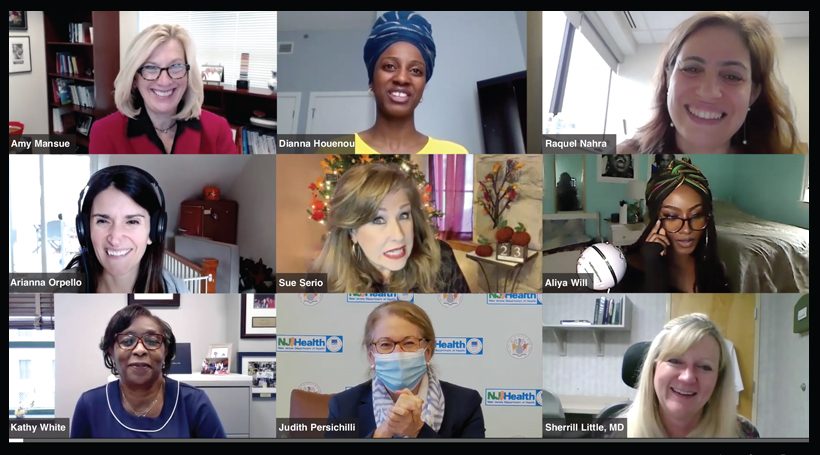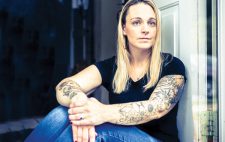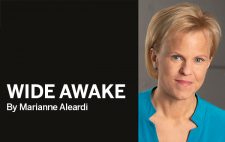As event after event was cancelled last year, we figured our Women’s Empowerment Series would have the same fate. The beauty of these sold-out events, after all, is gathering women together to talk. But then we started getting emails, Facebook posts and calls from people saying how much they missed the series and wished they could hear from inspiring women again. So we knew we had to make it happen, somehow.
Last month we took the series virtual, conducting 1-on-1 interviews with some of the most trailblazing women in South Jersey. Continuing our mission of supporting women and telling their stories, our series captures the pivotal moments of today. Our featured leaders share stories – some hilarious, some heartbreaking – that truly need to be heard. You can check them out at sjmagazine.net, but here’s a sneak peek.
Arianna Orpello, TD Bank’s SVP of Brand, Channel, Community and Field Marketing, admits she didn’t get what it was like for working parents – that is, until she became one:
“I never really recognized how hard it was to balance the demands of home and work and what was needed from me as a leader in that regard and, frankly, as a human. It’s so hard to explain it when you don’t understand. Once I experienced it, I realized. I remember reaching out to people and saying I’m so sorry if I wasn’t sensitive when that happened.
Dianna Houenou, chair of the NJ Cannabis Regulatory Commission, explains how marijuana legalization is a social justice issue:
“An arrest for a marijuana offense doesn’t just impact the individual. That person might not be able to get a job afterward, so you’re taking people out of the labor force. That person can lose their financial aid for their education, so now you’re affecting their ability to get educated. These are things that affect whole families and whole communities.
Raquel Nahra, MD, Cooper University Health Care Infectious Disease Specialist, discusses treating Covid patients, which led to a surprising conversation with her young son:
“One night my son was very tearful because he was scared one of us would die and he didn’t know what he would do with his brother and how he would take care of him. We had to explain to them that it could happen to anyone and it’s not going to happen today and we’re taking care of ourselves. It was a discussion that I never thought I would have with my 10-year-old and 12-year-old.
Sue Serio, Fox 29’s Good Day Philadelphia weather anchor, credits her on-air staying power to being true to herself:
“We have a personality-based television show, and if you try to be fake, you try to be something that you’re not, viewers are going to see right through it.
NJ Health Commissioner Judith Persichilli spoke openly about her experience managing the Covid crisis, describing the moment she knew just how serious the pandemic was:
“I got a call in the middle of the night from the state police because a hospital in North Jersey had run out of ventilators – could I look at where ventilators were and who could give up a ventilator. So when we had to move ventilators in the middle of the night, I knew we had a real problem.
Amy Mansue, Inspira’s President/CEO, warns that now is not the time to let down your pandemic guard:
“We’re not going to get through this, no matter how much PPE we have, no matter how much anything else, if we don’t have staff to take care of people – and we’re not going to have staff if this community spread continues at the rate it’s going. I know we’re all tired, but we need to hunker down even greater.
Artist/Influencer Aliya Will tells why she feels so strongly about representing Black women on social media:
“I personally think we don’t have enough advocates for us, so oftentimes I feel like Black women have to be our own heroes and our own advocates.
Kathy White, COO, Volunteers of America Delaware Valley, talks about how hard it was for women to start over after serving time in prison:
“The self-esteem was gone, the joy was gone, and they felt like they were going to walk around with this hanging around their neck for the rest of their lives. It wasn’t just about finding them a job, it was about building back their self-esteem and letting them know it’s ok. It happened, now how are you going to handle it?
Sherrill Little, MD, Co-Director of Women’s Imaging, SJRA, recalls the ways she was tested as the only woman in her residency program:
“They saved the hardest question for me that no one else knew, or they tried to put me on the spot to see if I would fall on my face or mess it up. But that just requires a little preparation ahead of time so you know what you’re doing.
There’s more! Watch all 12 of our Women’s Empowerment videos here.














